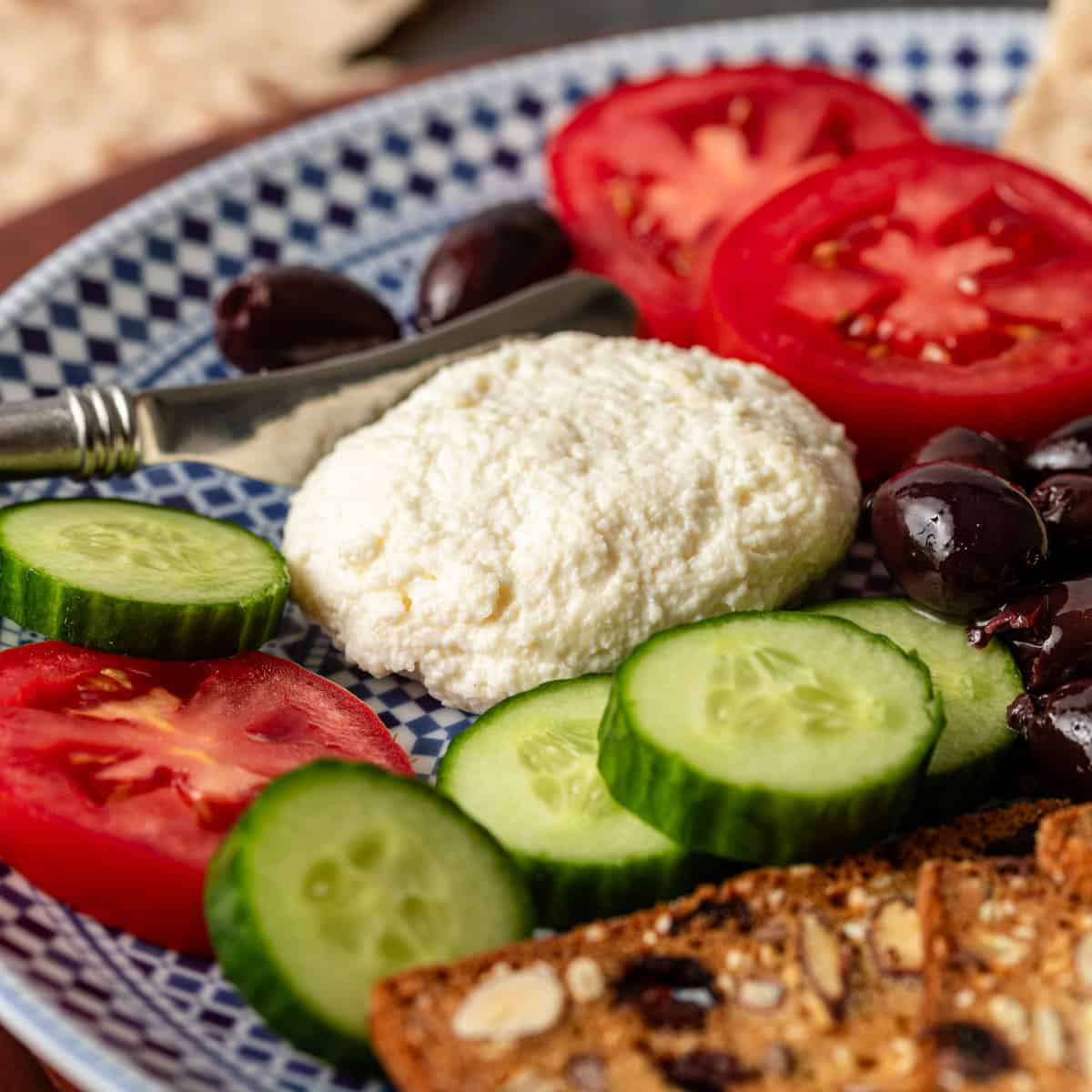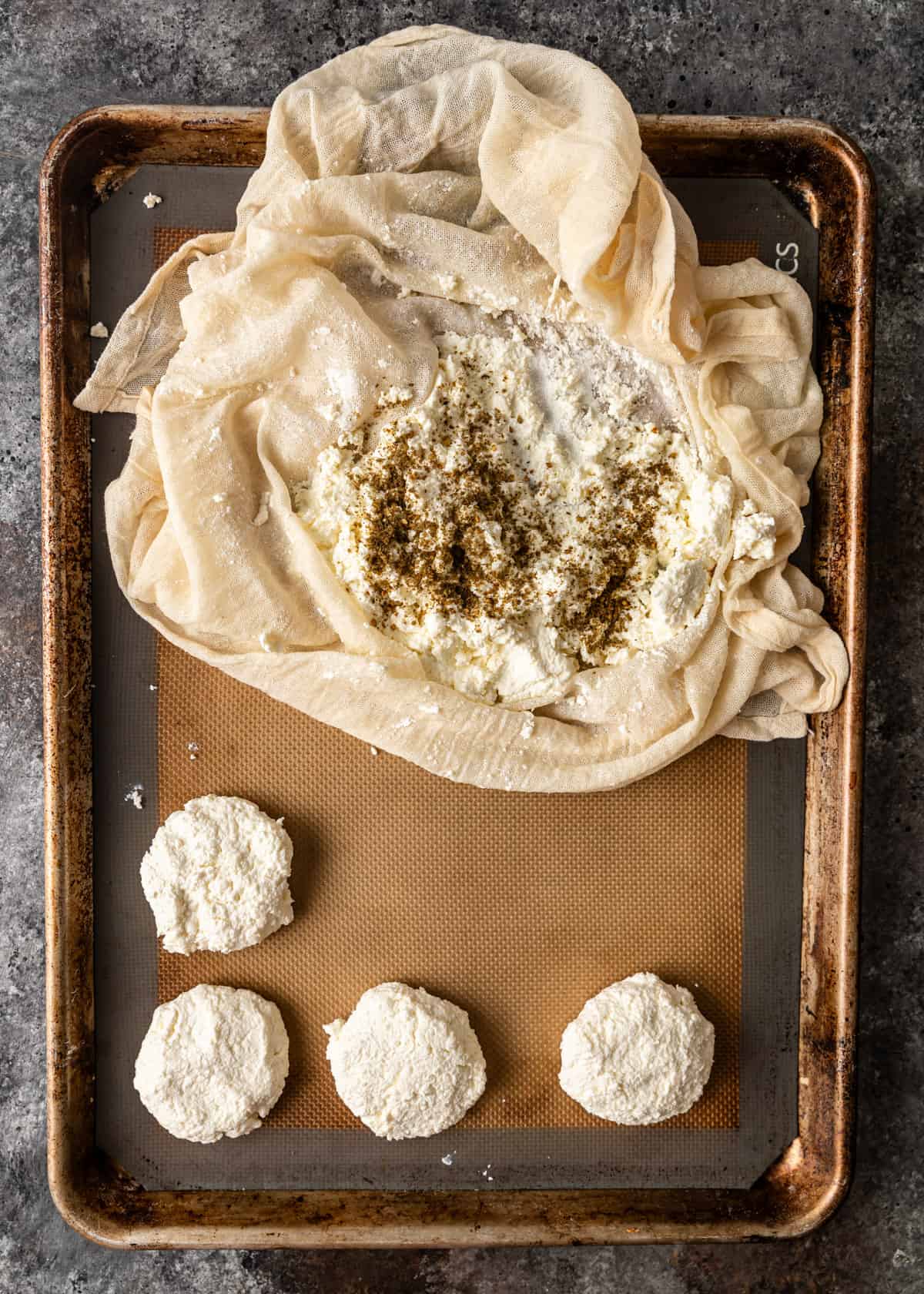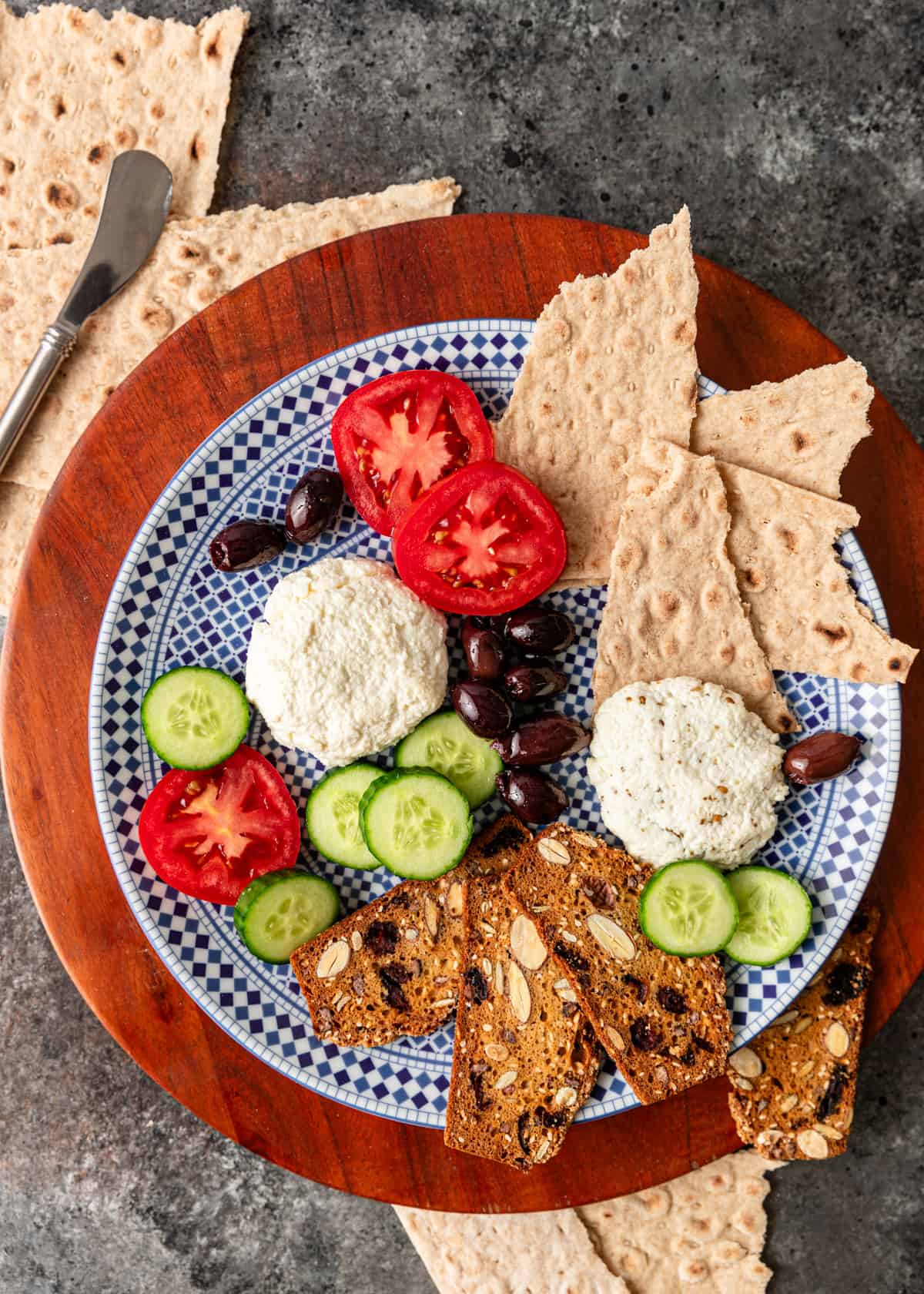Jibin (Lebanese White Cheese)
Jibin is one of the easiest, quickest homemade cheeses! With such a straightforward recipe and only five ingredients, it all comes together in less than 3 hours. This soft Lebanese white cheese is sort of like a milder feta that’s often enjoyed as a breakfast or snacking cheese.

Lebanese white cheese is known by many names: jibin, jiban, joban, jibneh, jibneh Arabieh… it’s hard to keep them all straight! But the taste and texture of this fresh cheese is unmistakable and irresistible from your very first bite.
This jibin recipe is so easy to make at home. It may seem like a lot of steps, but there’s nothing complicated about it. That’s one of the reasons why it’s so widely made and loved in Lebanon. The other reason is that it’s just plain delicious.

It’s mild, milky, and super creamy. With a subtle tang from the lemon juice (not so subtle if you add zaatar), its bright and rich flavor is amazing with vegetables like tomatoes, cucumbers, and — one of its most popular pairings — salty, briny olives.
Table of Contents
It goes particularly well with Mediterranean and Middle Eastern ingredients, and I love it on pide or any flatbread pizza!


Rennet or vinegar?
While vinegar can be used as a substitute for rennet in some cheesemaking situations, the exact amount is not a direct conversion and depends on the type of cheese you’re making, but generally, around 1/4 cup of white vinegar could be used to roughly replace one rennet tablet; however, this might not produce the same texture or quality as using proper rennet, and it’s best to experiment with small amounts to achieve the desired result.


Pasteurized and Homogenized Milk
When I first ventured into making cheese I made the mistake of using homogenized milk and the curds just didn’t separate from the whey like the recipes said it would. I was so frustrated until I read more…
Milk is processed in a variety of ways, and each type of processing affects the milk and the cheesemaking process differently. Homogenization is a way to make conventional milk smooth and creamy by forcing the milk through a nozzle that breaks down the fat globules. These smaller fat particles then remain suspended in the milk, so the cream does not separate and rise to the top as it does in non-homogenized milk. In cheesemaking, homogenization can lead to a softer, weaker curd and may cause difficulties in coagulation.
If the cheese curds are too soft as a result of using homogenized milk, try one of the following adjustments:
- Add calcium chloride to the milk. To use calcium chloride, dissolve it in non-chlorinated water and add the solution to the milk before coagulation.
- Slightly increase the amount of rennet used.
Pasteurization – The process of pasteurization treats the milk to kill any harmful bacteria. Milk can be heated to temperatures from 145°-212°F for various lengths of time, then immediately cooled to 39°F for storage and transportation. Pasteurized milk processed using any of these methods generally produces good results when cultured.
Ultra-pasteurized Milk (UP) or ultra-high temperature milk (UHT), is milk heated to 275°F or higher for about one second. Milk that has been ultra-pasteurized does not work well in cheesemaking because the proteins have been destabilized. As a result, the calcium in the milk does not bond properly to make a good curd. So, stick with just pasteurized.


(Be sure to check the recipe card for a full list of ingredients and quantities)
- Whole Milk – You need to use regular, pasteurized whole milk to make jibneh Arabieh. Remember that ultra-pasteurized won’t curdle properly!
- Rennet – A set of enzymes that promote coagulation, or curdling, in the joban.
- Lemon Juice – Acidic ingredients like lemon juice help to curdle the milk. But in addition to this, the slightly sweet, fruity taste and tanginess it gives the jibneh makes it extra delicious. You won’t always find it in Lebanese white cheese, but I never make this jibin recipe without it.
- Kosher Salt – It used to be said that iodine prevents bacteria growth in cheesemaking, but that’s actually a myth. That being said, kosher salt — which isn’t usually iodized — is best for this recipe (and most homemade cheeses).
- Zaatar – Tangy, herbal, aromatic — what’s not to love? A tablespoon of zaatar in your jibin makes it savory, a little nutty, and adds a different dimension of tanginess to the cheese. Highly recommended!

- Heat the Milk. Add milk to a pot and bring to temperature, between 90-100 degrees F. Remove from the heat.
- Prepare the Rennet. Crush the rennet in a small bowl with 2 tablespoons of cold water. Stir until dissolved.
- Add the Rennet & Lemon Juice. Add rennet mixture and lemon to the pot. Stir gently. If you don’t see whey (yellow liquid) forming after a few minutes, add a little more lemon juice, stir, and wait a few more minutes. Repeat until you see the whey.
- Let Sit. Cover and let sit in a warm spot for an hour.
- Break the Curds & Let it Settle. At this point, a yogurt-like, soft block of curd should be forming and pulling away from the edge of the pot. Gently break it up with a whisk, breaking it down until it resembles cottage cheese. Let sit for another 30 minutes.
- Strain & Drain. Dump the curd into a colander lined with a cheesecloth. It’ll look very wet, but it’s supposed to! Drain for an hour, stirring regularly.
- Season & Squeeze. Stir the zaatar and salt into the curds. Grab the ends of the cheesecloth and squeeze out the excess liquid from the jibneh. Taste and season as desired with more zaatar or salt.
- Shape & Refrigerate. Use your hands to roll and shape the soft jiban into patties or balls and arrange on the baking sheet. Squeeze out any extra liquid as you work. Cover with a cloth or paper towels and refrigerate overnight.
- Store & Serve. Serve the next day or store as directed below.
Recommended Tools
- Stainless Steel Pot – You never want to make something acidic (like yogurt or cheese) in an aluminum vessel because the acids will react with the metal, corroding it and leeching the aluminum into the liquid while giving it a strong, metallic taste.
- Mortar & Pestle – For crushing the rennet. If you don’t have a set, then just use the handle of a large knife or spoon.
- Digital Thermometer
- Cheesecloth
- Colander
- Sheet Pan & Parchment Paper – This is just an easily transferred, flat surface for refrigerating the joban.
Storing
To keep jibin fresh, store in a jar or other airtight container and cover with brine (see the recipe card for instructions to make brine at home) or good-quality extra virgin olive oil. It must stay refrigerated. Stored properly, it will last for up to 10 days.

Share this recipe on Pinterest!
Love this recipe? Share it with the world on Pinterest.
This is so important that I have to repeat it for a third time: pasteurized cow’s milk is ideal for this jibin recipe.
Homemade cheese is only as good as the milk that goes into it! You want to use whole milk so that the jiban mixture has the right fat and protein content to give it a creamy texture and rich, fresh flavor.
Rennet and vinegar are both coagulants, meaning they promote curdling of the milk. Rennet tends to be more effective and also works to form curds without making the mixture overly acidic. It also doesn’t affect the flavor of the cheese, whereas vinegar always will.
A lot of soft cheeses use vinegar because it’s a delicate, subtler coagulant that yields a delicate curd. However, rennet can do this too and is a great choice for homemade soft cheeses like jibin as long as you don’t use too much.
Subscribe to my Newsletter, follow me on Facebook, Pinterest, Instagram and YouTube for all my latest recipes and videos.

Jibin (Lebanese White Cheese)
Ingredients
- ½ gallon whole milk (Pasteurized, not Ultra-Pasteurized)
- 1 tablet rennet or 1/4 cup of distilled white vinegar (See Note 1)
- 2-3 tbsp fresh lemon juice
- 1 tbsp kosher salt
- 1 tbsp zaatar (optional)
Instructions
- In a large stainless steel pot (not aluminum), warm the milk to lukewarm temperature of between 90-100°F. Remove from the heat.
- Crush the rennet using a mortar and pestle (or use the handle end of a large knife or spoon in a small bowl). Stir 2 tablespoons of cold water into the rennet until completely dissolved. If rennet is unavailable, substitute by using 1/4 cup of distilled white vinegar.
- Stir the rennet mixture and lemon juice gently into the milk. Small pools of yellow liquid (the whey) should begin to form in the milk within a few minutes, indicating the whey is separating from the curd. If separation is not occurring, add more lemon juice, stir and wait a few minutes.
- Cover the pot and let it rest undisturbed in a warm spot for about an hour, or until a soft yogurt-like curd block forms. A separation around the edge of the pan will be evident where the curd is forming.
- Gently break up the curd into the whey with a whisk. It should resemble small curd cottage cheese. Allow it to rest in the pan for 30 minutes to settle.
- Layer a colander with a single layer of ultra-fine cheesecloth. Pour the curd into the colander (the curd will appear very wet and not clearly separate from the whey; however, the whey will drain off and the curds will become evident). Stir regularly to ensure even draining as the curds drain for an hour.
- Prepare a sheet pan with parchment paper or white paper towel. Season the curds with the salt and optional zaatar, stirring thoroughly. Then gather the ends of the cheesecloth together and gently squeeze out excess liquid. Open the cheesecloth and taste. Season with more salt if needed and shape the cheese into round balls or oblong patties about 1 1/2-2 inches thick at the center, pressing out excess whey as you shape them.
- Place the patties on the lined sheet pan and lightly cover with additional paper towel. Refrigerate overnight.
- To store the jibin, place whole or cut-up patties in a jar and cover with brine (1 cup warm water to 2 tablespoons kosher salt; bring to room temperature or chill before covering the cheese with it), or good EV olive oil. Keep refrigerated. Good for 10 days.
Notes
- While vinegar can be used as a substitute for rennet in some cheesemaking situations, the exact amount is not a direct conversion and depends on the type of cheese you’re making, but generally, around 1/4 cup of white vinegar could be used to roughly replace one rennet tablet; however, this might not produce the same texture or quality as using proper rennet, and it’s best to experiment with small amounts to achieve the desired result.
- Recipe adapted from Maureen Abood.
Nutrition
The information shown is an estimate provided by an online nutrition calculator. It should not be considered a substitute for a professional nutritionist’s advice.













